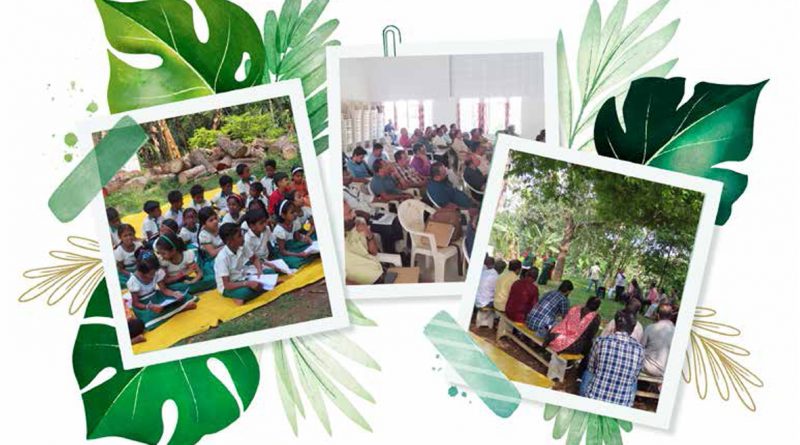The New Ray of Hope in Tribal Education

There are as many as thirty-seven tribal sects in Kerala, though their total population in the state is less than five lakhs. It could be possible to spot tribal people even in the non-hilly Alappuzha district, despite the fact that the indigenous people of the State mostly dwell by the Western Ghats, more popularly known as Sahya Parvatham in Malayalam. The Western Ghats form the eastern border of the State, right from Thiruvananthapuram to Kasaragod, and the tribes live in the lap of Sahyanin varying density, speaking different dialects and following dissimilar customs. Wayanad district has the highest number of tribes in Kerala, followed by Idukki, Palakkad, Kasaragod, and Kannur districts. Though various tribal groups are at different levels on the developmental scale, on the whole, these vulnerable and marginalized sects of our demography lag behind on socio-economic and educational fronts. Issues and predicaments like economic backwardness, geographical hazards and disadvantages, language barriers, health issues including congenital ones like sickle cell anaemia, epilepsy and haemophilia, malnutrition, the multiplicity of customs, socio-economic handicaps, ethnic diversities, acquired habits like alcoholism and historic reasons grossly enmesh them and impede their progress in every sphere. Tribal development is one of the focal areas of the Governement. In line with this vision, the State Institute of Educational Management and Training- Kerala (SIEMAT-Kerala) undertook a rapid study in 2022 to identify the prevailing educational issues in tribal areas of Wayanad, Palakkad, Malappuram, Idukki, and Thiruvananthapuram districts. Armed with the findings and recommendations of this study, SIEMAT-Kerala conceived an innovative program named RAAP (Re-calibration of Approach and Attitude Program). The primary objective of this program is to provide orientation training to educational officers and school heads operating in tribal regions.
SAHYA CHANGE TEAM
Can we truly address the educational challenges existing in the tribal belt through the sole administration of RAAP training to officers and school heads? The answer, unequivocally, is no. There are several other functionaries in the tribal education system of the state like teachers, teachers of Model Residential Schools, mentor teachers etc. functioning at different levels and capacities.
Health and education standing committee chairpersons of local self-governments too have a decisive role in tribal education. But SIEMAT-Kerala does not have the mandate and resources to reach out to each such category. Hence we thought of forming a state-level collective of master trainers by the name Sahya Change Team to render RAAP training to various target groups Formation and training of the Sahya Change Team were included in the third hundred days programme of the State government. Fifty-odd committed persons from the ranks and files of our educational system and a few vibrant functionaries from NGOs were handpicked to form the team. A four-day residential workshop was conducted at SulthanBethery, Wayanad from 16th to 19th May 2023 in round table mode to give orientation to the master trainers. V.Sivankutty, Minister for General Education inaugurated the workshop on 16th May. Seven segments were incorporated in the workshop to discuss and acquire awareness and skills in areas like change management, convergence, academic interventions&vocational i z a t i on, recalibration of approach and attitude, and micro planning. The team also prepared modules for RAAP training in the workshop, based on the forgoing areas. Besides several case studies and success stories were presented and discussed in the workshop. Sahya Change Team is envisaged as a state-level resource group of well-trained and properly charged change agents whose service can be utilized by any agency including the line agencies of the general education department, tribal development department, forest and excise departments, NGOs, and local self-government as resource persons and motivators for planning innovations and for conducting orientation programmes for any target group or functionaries of tribal areas. Of course, members of the Sahya Change Team are going to be the main mentors and motivators of the RAAP training directly conducted by SIEMAT-Kerala. We are also keen to ensure that their transformative influence permeates every corner of tribal education with the help of line agencies, local self-governments, and through ingenious cascading.
SAHYAKIRANAM
Sahyakiranam represents a harmonious blend of meticulous planning, the convergence of ideas,schemes, efforts and resources, remedial measures, nurturing connections, academic experimentations, educational innovations, supportive guidance, and the enhancement of employability. It is a beacon of hope that illuminates the path toward a profound shift in the approach and attitude of all stakeholders involved in the tribal sector. Sahyakiranam embodies an educational laissezfaire approach, inviting the active participation and contribution of non-profit agencies, departments, groups, and individuals. Regardless of their size or resources, all are encouraged to integrate their ideas, schemes, projects, expertise, and resources into this collective mission. (Certainly, there would be stringent filters to prevent exploiters from entering). Change and convergence will serve as the guiding principles of Sahyakiranam, fostering a dynamic and collaborative movement that harnesses the collective strength of diverse stakeholders. Sahyakiranam will repudiate conventions, methods, and many sentiments of conformists. Are you still interested in the movement? Then doors are open for you to join the endeavour to make a difference in tribal education and life. Reach out to SIEMAT-Kerala or your local District Institute of Education and Training (DIET) to embark on this transformative journey. Together, we can weave a tapestry of change, igniting a new ray of hope in the lives of tribal communities.


